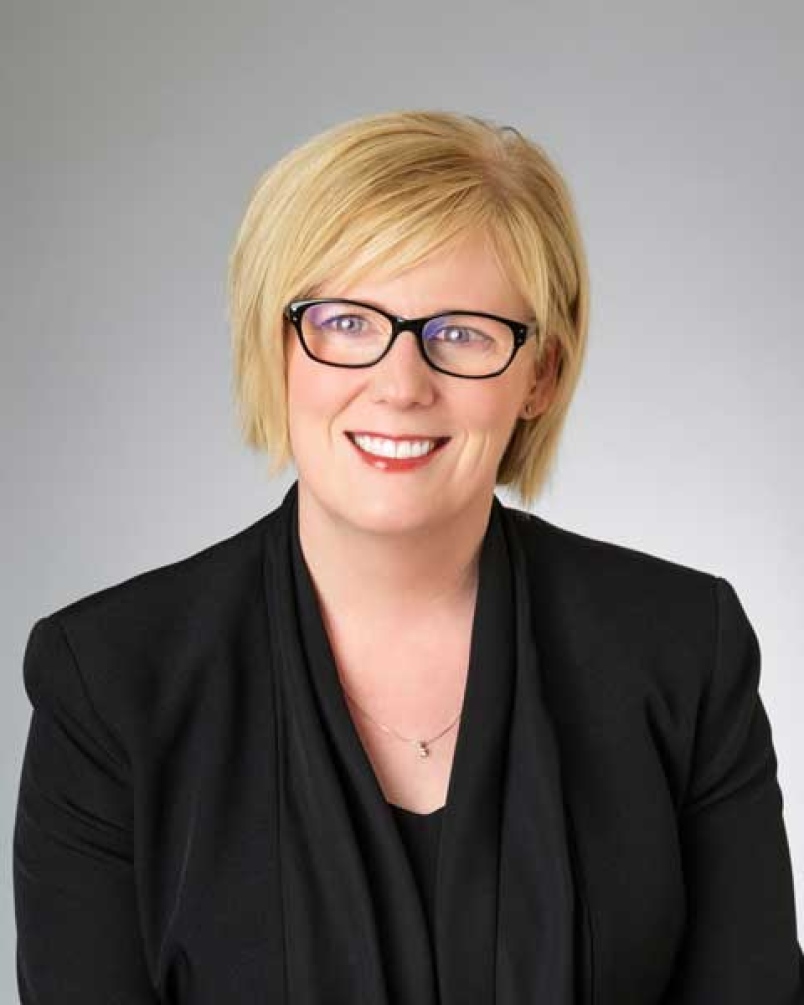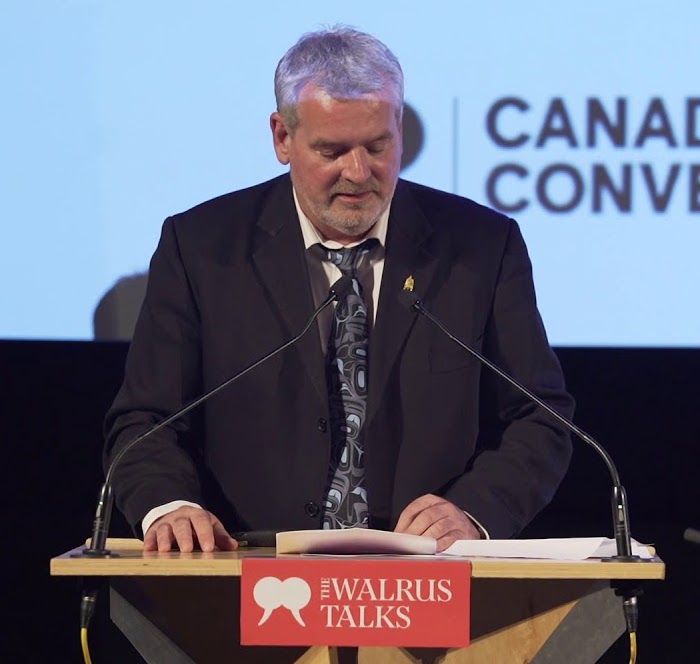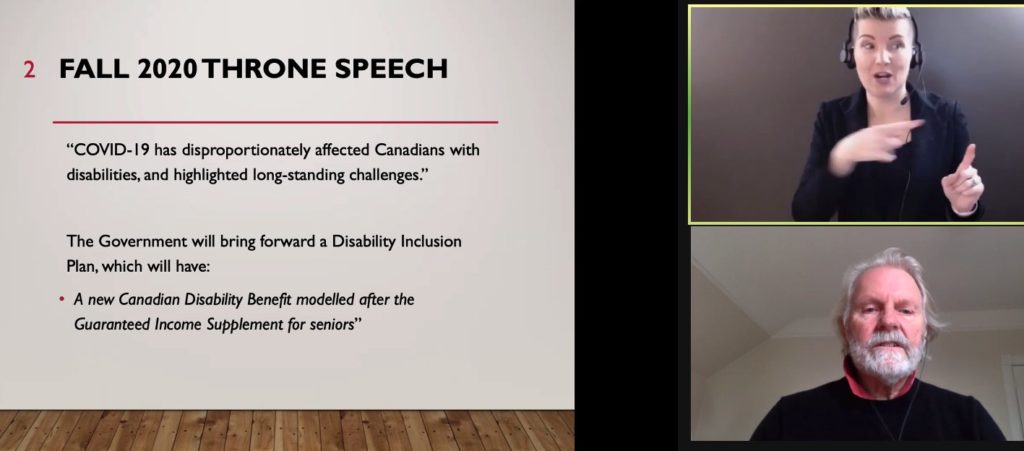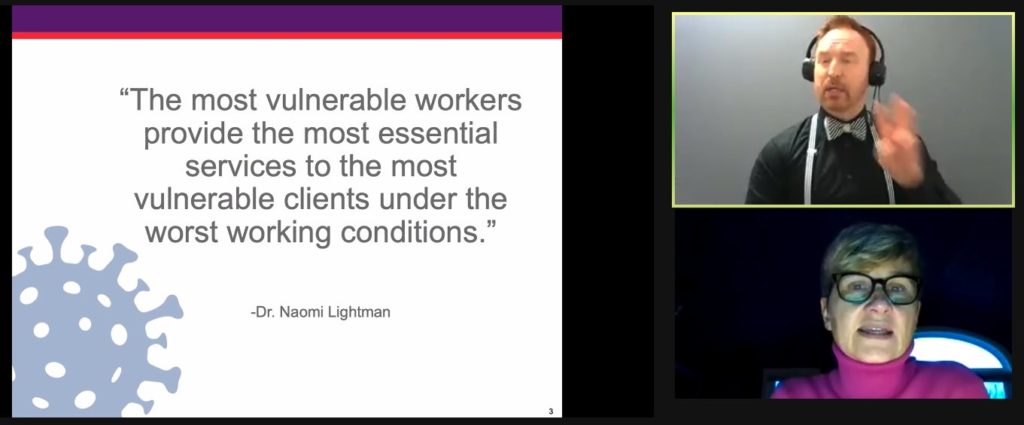Inclusion Canada and People First of Canada (PFC), in collaboration with the Office for Disability Issues (ODI), Employment and Social Development Canada, recently hosted the 11th Annual Federal Policy Forum for Inclusion on December 3rd – held for the first time in a virtual format. This year’s theme was Intellectual Disability & COVID-19: Challenges, Opportunities and the Road Ahead – Lessons from Those Left Behind. As the Government of Canada shifts towards pandemic recovery, the Policy Forum provided an opportunity to better understand how Canada can sustain progress made to support people with disabilities in a post-COVID-19 world.
The day started with land acknowledgements and opening remarks from Robin Acton, President of Inclusion Canada, and Kory Earle, President of PFC. We were thankful to be joined by the Honourable Carla Qualtrough, Minister of Employment, Workforce Development and Disability Inclusion and Neil Belanger, Executive Director of the British Columbia Aboriginal Network on Disability Society (BCANDS), who provided the keynote address for the Forum. They discussed the work of the federal government’s COVID-19 Disability Advisory Group (CDAG).

The Honourable Carla Qualtrough 
Neil Belanger
Minister Qualtrough noted how CDAG has changed the way Canada supports persons with disabilities in response to a crisis, emphasizing the importance of action because “our systems are working as they were built. They just weren’t built to include all of us and we need to change that.”
Neil Belanger discussed his role as co-chair of CDAG and his hope for future federal government support with the newly created Ministerial Disability Advisory Group (MDAG), an evolution of the COVID-19 Advisory Group, to address areas of focus discussed in the Fall 2020 Throne Speech: “Each of you here today is an architect, building better systems that affect persons with disabilities.”
Inclusion Canada is pleased to announce that MDAG will be chaired by Inclusion Canada’s Executive Vice-President, Krista Carr.
The problem is our systems are working as they were built. They just weren’t built to include all of us and we need to change that.”
– The Honourable Carla Qualtrough, Minister of Employment, Workforce Development and Disability Inclusion

Panel 1: Healthcare Ethics and Accessibility
The first panel of the day covered issues around accessible healthcare services during the pandemic and potential improvements to the system to better support people with disabilities. Self-advocates Kory Earle and Victor Pereira discussed mental health as a pandemic in itself, discussing their experiences in seeking adequate resources. PFC & the Centre for Addiction and Mental Health (CAMH) have created a 6-week, virtual mental health course that offers a safe and open space for participants across the country to “make their own lives better,” as Victor described it. The two advocates also called on the government to ensure that mental health supports continue to be a healthcare priority.
Inclusion Canada’s Marc Muschler provided a family perspective on healthcare access during the pandemic, reflecting on his brother Michael’s difficulty to safely access a COVID-19 test in the early days of the pandemic as someone with a developmental disability and compromised immune system. His experience illustrated that the wellbeing of persons with disabilities was an afterthought during the pandemic despite their vulnerable position in society.
“The very system built to support [people with disabilities] during a pandemic was working against them to place their lives at risk.”
– Marc Muschler, sibling and advocate
Mariam Shanouda, a staff lawyer at ARCH Disability Law, presented concerns about existing triage protocols that would prioritize the health of some people over others during periods when the need for services in critical care is greater than the availability of resources. She noted how the pandemic has been an example of either a discriminatory triage protocol or no triage protocol existing in provinces and territories. ARCH and over 60 other organizations have made it a priority to encourage the government to include people with disabilities in consultations while taking a human-rights based approach to the matter, writing open letters to demand action.
Dr. Yona Lunsky from CAMH’s Azrieli Adult Neurodevelopment Centre discussed how the pandemic has impacted the accessibility of healthcare information. While the pandemic has proved the effectiveness of moving information online, we must continue to provide content in all mediums to ensure accessibility. Additionally, Dr. William (Bill) Sullivan, Associate Professor, Family Physician, and Director of the Developmental Disabilities Primary Care Program at Surrey Place Centre, spoke to the Government of Canada’s Public Health Ethics framework, highlighting that the country’s approach must ensure the wellbeing of all citizens, not merely the greatest good for the greatest number. Inclusion is needed to make decisions about individuals and groups and healthcare is just one of the realms where this is evident.

Panel 2: Poverty and Income Security Reform
The forum’s second panel focused on the Disability Tax Credit (DTC) and income security, with perspectives from people with lived experience and policy experts. Chris Rowley, a self-advocate from Alberta, discussed his experiences applying for the DTC, calling the process daunting and overwhelming. He found the application process for the COVID-19 Disability Benefit similarly difficult. Joanna Gauthier, another self-advocate, explained how the pandemic has exacerbated her own financial struggles, which is true for many people with disabilities across the country.
Chris and Joanne’s concerns led into discussions about improvements to existing systems for people with disabilities. Laurie Beachell, former co–ordinator of the Council of Canadians with Disabilities (CCD), examined the DTC as a model of income security with a medical approach to disability that has several associated challenges. By redefining its purpose and understanding it more broadly, we can better ensure equitable access to income support. Simplifying forms and creating help lines or outreach programs to better assist people with disabilities in completing an application were considered.
Sherri Torjman, Vice-Chair of the Disability Advisory Committee reporting to the Minister of National Revenue, discussed the Canadian Disability benefit proposed by the federal government in the fall 2020 Throne Speech. She discussed the importance of fitting the new benefit in with existing programs in the short-term to ensure that no one with a disability in Canada lives in poverty. Sherri also highlighted the need to expand eligibility for the benefit to build a strong foundation for income security in years to come.

Dr. Michael Prince, Professor of Social Policy at the University of Victoria and long-time disability advocate, wrapped up the panel by sharing his thoughts on the new Canadian Disability benefit. He argued that eligibility needs to be both inclusive and modern to address pressing issues within the disability community such as inadequate income, unemployment and underemployment, and the inaccessibility of many federal programs and benefits. As Krista Carr said during the Q&A portion of this panel, “We have proven during this pandemic that there are other ways of doing things”. Sharing perspectives and adopting inclusion at all levels of government is necessary to create change.

Panel 3: The Reality of Congregate Care during the Pandemic
The final panel of the day focused on institutionalization and COVID-19. Kevin Johnson, a self-advocate, talked about his experiences as a receiver of disability-related services during the pandemic, focusing on the difficulties of working around service provider rules in order to have his fiancé stay with him or for him to see family. It should not be up to any agency to decide what is safe for him, he argued. People with disabilities deserve the right to make the same decisions as everyone else, balancing tolerance for risk with individual choice, but many long-term care residents or consumers of disability-related supports have not had this opportunity.
John Leggat, President and CEO of St. Amant reflected these ideas in discussing his experience as a residential service provider in Manitoba. He emphasized the need to create support networks, both from a government perspective and a community perspective, to ensure that people with disabilities can make decisions for themselves and live a rights-based life with agency.
As a representative from the Office of the Chief Public Health Officer of Canada, Bonnie Hostrawser reviewed the Public Health Agency of Canada’s document about COVID-19 and its impacts on people with disabilities. In looking at the effects that congregate care has had on residents’ susceptibility to contracting the virus, she outlined the need to transform existing systems to be more sustainable. She stressed the importance of working together in our communities to support everyone with both accessible services and an abundance of information as the country recovers from the pandemic.

Bonnie Hostrawser presenting the Public Health Agency of Canada’s document on COVID-19’s impact on people with disabilities.
Closing Panel 3, Barbara Gillis shared her perspective on institutionalization as the mother of a son with autism spectrum disorder (ASD). She made it clear that the rules in congregate housing determine the way residents live their lives and that what happens behind closed doors would never be acceptable outside of an institution. “What [my son] needs is acceptance and patience”, she said, which resonated with attendees and presenters alike.
Closing Remarks
The day was closed out with remarks from Inclusion Canada’s Executive Vice-President Krista Carr, Shelly Fletcher, Executive Director of People First of Canada, and Krista Wilcox, Director General at the Office for Disability Issues, Employment and Social Development Canada. Their overall message about hope and resilience was inspiring to all. As Krista Carr said, “Right now is our moment as a disability community to seize the day… rise up, and work together collaboratively, all of us, in coming out of this pandemic far better than we ever went in.”
The 11th Annual Policy Forum on Inclusion illustrated that the COVID-19 pandemic has provided an opportunity to reassess inclusion in Canada and make the changes needed to build a fully inclusive and accessible country for people with intellectual disabilities and their families.
To download PowerPoint presentations from the Policy Forum, please use the links below:
Panel 1:
Panel 2:
Panel 3:
